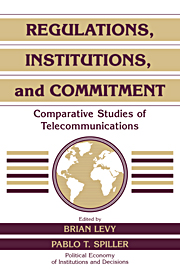Book contents
- Frontmatter
- Contents
- Foreword
- Series editor's preface
- Preface
- List of contributors
- 1 A framework for resolving the regulatory problem
- 2 Telecommunications regulation in Jamaica
- 3 The United Kingdom: A pacesetter in regulatory incentives
- 4 Chile: Regulatory specificity, credibility of commitment, and distributional demands
- 5 The political economy of the telecommunications sector in the Philippines
- 6 Argentina: The sequencing of privatization and regulation
- Notes
- References
- Index
6 - Argentina: The sequencing of privatization and regulation
Published online by Cambridge University Press: 05 June 2012
- Frontmatter
- Contents
- Foreword
- Series editor's preface
- Preface
- List of contributors
- 1 A framework for resolving the regulatory problem
- 2 Telecommunications regulation in Jamaica
- 3 The United Kingdom: A pacesetter in regulatory incentives
- 4 Chile: Regulatory specificity, credibility of commitment, and distributional demands
- 5 The political economy of the telecommunications sector in the Philippines
- 6 Argentina: The sequencing of privatization and regulation
- Notes
- References
- Index
Summary
Argentina is a very recent entrant to the small group of countries with privately owned telecommunications firms – and, given its history, an unexpected one. Argentina entered this group in November 1990 when the government sold the Empresa Nacional de Telecomunicaciones (ENTeL) to private investors. Although it is too early to definitively assess the impact of this sale, the sequencing of the privatization and the development of a regulatory regime present some interesting issues.
The political situation during the transition from the administration of President Raúl Alfonsín to that of President Carlos Saul Menem in 1989 presented the Menem government with a brief opportunity to introduce radical economic reform. Privatization was a central component of this reform program, and ENTeL was the first company put on the block. The sale became a test of the Menem government's ability and resolve to reform the economy. Rapid completion of the sale was the overriding concern, and development of a regulatory regime initially was neglected.
Regulation plays an important role in the private provision of telecommunications. Portions of the sector are characterized by economies of scale, making an argument for limiting entry in the interests of efficiency. However, inadequate competition can lead to abuses of monopoly power and to demands from customers and suppliers for regulatory protection from these abuses. Standards and interconnection rules affect the efficiency of the sector. High sunk costs and asset specificity make telecommunications firms especially vulnerable to the risks of expropriation.
- Type
- Chapter
- Information
- Regulations, Institutions, and CommitmentComparative Studies of Telecommunications, pp. 202 - 250Publisher: Cambridge University PressPrint publication year: 1996
- 5
- Cited by



